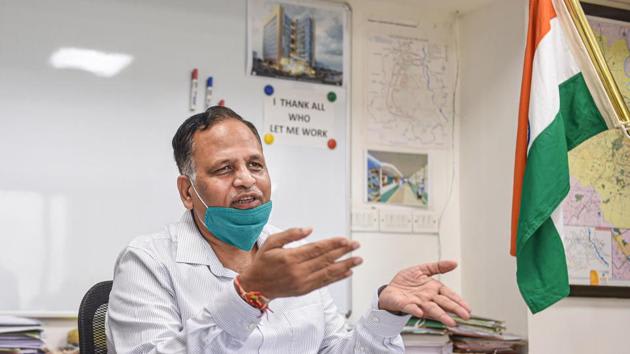
In a week, over 500 intensive care unit (ICU) beds have been added in Delhi’s private sector hospitals for the treatment of patients with coronavirus disease (Covid-19), health minister Satyendar Jain said on Saturday, even as the Capital added 4,071 cases of the infection. He also said that the case positivity rate in the city would see a further downward trend in the coming days, on the back of the governments efforts to scale up Covid-19 tests in the Capital.
“In the next two or three days, the number of beds will go up further. ICU beds are being increased in the government hospitals as well, and we are monitoring the capacity of all the hospitals regularly. Over 8,000 beds earmarked Covid-19 beds are still vacant, and we will increase the count further if necessary," he said.
“Not many actually need beds with ventilators. As the number of ICU beds go up, ventilator beds will slowly free up," Jain added.
As on Saturday evening, according to the state government’s Delhi Corona website, 15,323 beds in Delhi’s government and private hospitals are earmarked for the treatment of Covid-19 patients. Of these, 7,025, or 45.8%, beds were occupied. Over 2,900 ICU beds are reserved for Covid-19 patients, and 66.6% currently occupied.
With the government scaling up testing for Covid-19 from the first week of September, Delhi has added over 4,000 new cases of Covid-19 every day except one, since September 9 . However, the cumulative test positivity rate — the number of positive cases of the total number of people tested in the city so far — dipped below 10% on Friday, the health minister said.
“The cumulative positivity rate of all cases reported dropped below 10% for the first time on Thursday . So far, the positivity rate is 9.83%, earlier this was between 11 and 12%. The case fatality ratio (fraction of people who die among those tested positive) stands at 0.69% in the last 10 days, and 2.05% for all deaths so far," Jain said.
Delhi has so far seen 4,945 people die of the disease.
Jain also said the proportion of the gold standard reverse transcription polymerase chain reaction (RT-PCR) tests looks skewed because Delhi government has scaled up testing massively.
Over the last week, just over 17.5% of all tests conducted in the city were done using the RT-PCR method.
“Show me one case in Delhi where a person wanted to get tested but could not get it. Even if they want RT-PCR test they can get it. But for surveillance in people without symptoms, rapid antigen tests can be done in bulk. The testing guidelines have also been revised to remove the need for doctors’ prescriptions," the minister said.
“We increased the number of tests over the last 10 to 12 days, and have seen a downward trend in positivity rate in the last two days. The impact will be visible in the coming week," he added.
When asked whether there was community transmission in Delhi, he said, “Community transmission is a technical term, but with so many cases being reported from Delhi and other parts of the country, community transmission should have been accepted. But, it is only the centre and scientists from the Indian Council of Medical Research (ICMR) who can say so, however the infection is spreading in the community."
“What we have learnt and what WHO (World Health Organization) defines as community transmission is a case for which authorities are not able to trace the contact from where they got the infection. And we are getting such cases. So the answer is fairly obvious. But, discussing this makes no sense now. The objective has to be to control further spread of the infection and reduce morbidity and mortality because of it," said Dr Puneet Mishra, professor, department of community medicine at the All India Institute of Medical Sciences.
Sign on to read the HT ePaper epaper.hindustantimes.com